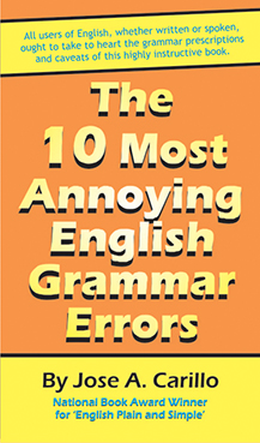Starting today, November 7, 2017, the Forum will run a series of 20 essays on what I consider as the most annoying English grammar errors. The series will be posted consecutively every Tuesday and Friday until December 22.1 – The Footloose Modifier and Its Three VarietiesBy way of introduction, a reader who simply called herself Deirdre wrote me sometime in mid-2007 asking for the 10 common English grammar errors that annoy me most. I promised to take up the subject, but I must admit that I had been rash in telling her in advance that I would entitle it “The 10 grammar errors I hate most.” That was a slip. I must say that I’m actually incapable of hating grammar mistakes; after all, as an editing and writing consultant, I make a substantial part of my living straightening them out. The feeling is more of discomfort, of annoyance in realizing that people you expect should know better could be so slipshod in their English. Deirdre’s original verb, “annoy,” was therefore more appropriate, so I used “The 10 grammar errors that annoy me most” instead as working title for the projected series.

The truth is that grammar and usage errors aren’t so uncommon in manuscripts intended for publication, and at least in my case, it’s always a rare and pleasant surprise to go over a manuscript that hardly requires any grammatical tweaking. But no matter how ridden with grammar errors a manuscript is, all it often takes to rectify things is a simple edit or rewrite—that’s all. The real problem is when the errors get past the editors and proofreaders unrecognized and end up on the printed page. When this happens much too often in a publication, of course, it brings into question not so much the grammar proficiency of its writers but the editing competence of its editors, and I must hasten to add that it’s in this context that I intend to write about the subject.
In general and roughly in the order of their mention, these are the 10 grammar errors that I find most annoying: (1)
footloose modifiers, whether of the misplaced, dangling, or squinting variety; (2)
mangled idiomatic expressions; (3)
operative verbs far detached from their subject; (4)
subject-verb disagreements; (5)
intransitive verbs forced to act as transitives; (6)
wrong pronoun usage; (7)
misuse of participles; (8 )
misuse of prepositional phrases and prepositional idioms; (9)
wrong use of basic verbs such as “come” and “go”; and (10)
fused sentences.
Now let me go to my bill of particulars for these grammar errors:
FOOTLOOSE MODIFIERS IN GRAMMAR ARE LIKE DANCERS GYRATING IN ABANDON
Footloose modifiers. What I consider a very serious indication of English grammar inadequacy is a writer’s blissful use of footloose modifiers and an editor’s blind spot for them. Look at this glaring example of a footloose modifier that came out on the front page of a leading newspaper many years ago: “Wanted for killing of leftists in her home country, Spain arrests widow of Juan Peron and former president of Argentina, Isabel Peron, now 75.”
Mind-bending sentence constructions like this invariably raise the following questions: What arrested who? What’s the phrase up front actually modifying in the main clause? Who or what, in fact, is the subject of the sentence? If you are up-to-date in world events, of course, you’d discover in a snap that the real subject of the sentence is “Isabel Peron,” not “Spain,” and that what we have here is a recklessly misplaced modifier. Indeed, the phrase “wanted for killing leftists in her home country” applies to “Isabel Peron” and not by any stretch to “Spain.”
The thing is that the general rule for dealing with misplaced modifiers isn’t really that difficult to apply. It’s simply to position the modifying word or phrase as close as possible to the noun it modifies, as the following construction does very efficiently: “
Wanted for killing of leftists in her home country, Isabel Peron, 75, widow of Juan Peron and former president of Argentina, is arrested in Spain.” How I wish all writers and editors would learn to routinely use this simple rule!
We’ll take up other types of annoying footloose modifiers next, after which we’ll proceed to mangled idiomatic expressions.
This essay, 1st of a series of 14, first appeared in the column “English Plain and Simple” by Jose A. Carillo in the July 30, 2007 issue of The Manila Times.
It subsequently formed part of the book The 10 Most Annoying English Grammar Errors
, © 2008 by the author, © 2009 by the Manila Times Publishing Corp. All rights reserved. (Next:
The Bane of Dangling Modifiers) Friday, November 10, 2017